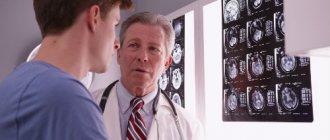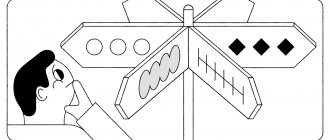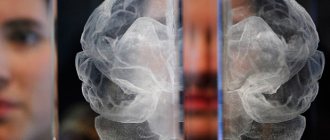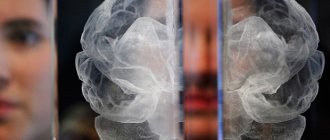Finding the Roots of the Problem
The appearance of memory problems in a child is an alarming call. The cause may be either simple fatigue and absent-mindedness, or functional disorders of brain activity. Constant monitoring on the part of parents of the ability to learn and remember new skills is a guarantee of the correct development of the little person.
Whether a child has memory problems can be determined by noting the following behavioral features:
- Insufficient adequacy of the baby in communicating with friends;
- Difficulties in responding to direct requests;
- Problems in completing new tasks;
- Complete confusion and misunderstanding in complex matters, an attempt to abandon them;
- Problems with attention;
- The child cannot apply skills in the instructions given to him.
Problems with learning may be caused by social, hereditary and acquired conditions of memory impairment. Social reasons include family lifestyle, constant lack of necessary foods and vitamins in the baby’s diet. It has a negative impact on development if the child almost never spends time in the fresh air or is not given much exercise; he is left to his own devices.
Hereditary causes include congenital mental retardation. In the case of acquired memory problems, the cause may be mental illness, the consequences of severe brain injury, conditions after a coma, or intoxication.
Partial memory loss is not uncommon after infectious diseases. In most cases, partial memory loss is possible due to a combination of several circumstances: an unfavorable environment in the children's group and at home, anxiety and fears, lack of vitamins.
Main reasons
The reasons can be very diverse. The most common, according to statistical studies, is asthenic syndrome. This is the name given to a complex of symptoms: psycho-emotional stress, emotional lability, increased anxiety, signs of depression. The second most common reason is the consequences of any disease.
But there are a number of other factors that can lead to memory impairment:
- Other asthenic conditions: stressful situations, overwork.
- Excessive alcohol consumption. Leads to somatic disorders and structural changes in the brain.
- Diseases associated with circulatory pathologies in the brain.
- Head injuries.
- Tumors localized in brain tissue.
- Psychiatric pathologies.
- Congenital intellectual disabilities - both genetic and associated with birth injuries.
- Metabolic disease.
- Chronic intoxication (for example, salts of heavy metals)
Accordingly, treatment in each case is specific, and careful diagnosis is required, since there are many reasons.
Memory recovery techniques
What to do if a child has poor memory and attention is advised by specialized specialists: a child psychologist and a neurologist. You may have to conduct a full comprehensive examination and prescribe therapeutic treatment. As a rule, the prescription includes a complex of vitamins and medications that improve cerebral circulation - nootropics. It is recommended to undergo a course of treatment with a psychologist; the purpose of such classes is to make the child believe in his own strength and remove anxiety and fears.
At school, after primary school, the workload increases sharply. There are frequent cases of complaints from middle school students about difficulties with memorization, frequent headaches, and fatigue. Children are distracted in class, inattentive, and their performance declines. What to do if a 10-year-old child has poor memory depends on the cause of the problem. Often it lies in the unpreparedness of the brain for new loads.
In such cases, parents are advised to review their child's time management over the course of a few days. Timing will give a picture of the time spent on clubs, sports sections, computer games, and recreation itself. Children, like adults, are required to rest in order to have time to recuperate. With a lack of time for rest and short sleep, the brain does not have time to rest, and as a result, the student cannot concentrate, he is distracted, and memory problems appear.
To correct the situation, parents are obliged to organize the child’s working day and should help with particularly difficult tasks. It is recommended to pay special attention to enhanced nutritious nutrition. Be sure to increase the consumption of fish, meat products, and fruits in your daily diet. If possible, add blueberries, they activate the brain.
It must be remembered that regular memory development exercises help restore its functions. The brain should be trained regularly from the very cradle; even in adulthood, regular exercises can significantly develop the quality of memory.
Recommendations from psychologists and speech therapists include reading fairy tales to little ones, preferring fairy tales with frequent repetitions, they are easier to remember, and auditory memory develops here. When the child grows up and can repeat poems and short passages himself, the number of texts to memorize should be increased.
A child psychologist will tell you what to do if a child doesn’t remember poetry well. Motivation for success when reading poems and fairy tales learned by heart gives impetus and incentive to the development of semantic and figurative memory. You should devote as much time as possible to the baby, he should not be left alone, only in communication, in play situations, in continuous “why” the brain develops, and the number of connections between neurons increases.
The Montessori method is recommended in games with children: after playing with a certain number of objects, you should quietly pick up one of the objects. The child must determine on his own, without prompting, which item is missing. This game develops observation skills and is very useful.
The game “Where and how it lies” will help develop the child’s thinking and logical memory. For this game, it is recommended to collect small objects from different rooms of the apartment into one box (bag). The child takes out the items one after another and comments on the location of the item in the apartment, then he takes all the items back to their place. Or train with tasks like these:
To develop associative memory, you should pay attention to small details while talking with your child, for example, the smell and bright color of flowers in a flowerbed, details of clothing of passers-by, the shape of clouds before rain. Associative memory helps to remember images of various events and phenomena.
Memory training in children 2-6 years old
This is a period of active formation and development of memory; children become “why-seekers” - they are interested and curious about everything that surrounds them. They learn letters and numbers, master reading, writing, and arithmetic operations.
At this age, involuntary memorization predominates, so information with a plot and emotional overtones is better remembered. Kids practically do not perceive dry facts.
The Doman technique at this age is used both for memorizing new words and for playing games. For example, you can ask your child to find an extra element among the cards or combine images into groups based on some characteristic.
To help your child remember information faster, teach him mnemonics methods - for example, the method of associations. Ask the child to name what he associates this object with, and then, when trying to remember, prompt the association.
Be sure to include play exercises to develop memory in your baby’s daily schedule. Some of them are given below.
Word game
Tell your baby a few words and ask him to repeat them. Over time, complicate the task - increase the number of words, ask them to repeat them, maintain order.
Finding differences
Show your child pictures with similar images and ask him to find the differences. This exercise trains memory, develops attentiveness and the ability to concentrate.
Purchases
When you go to the store, ask your child to remember a list of 3-5 products. And in the store, give them the task of remembering them. The task can be complicated by increasing the number of positions.
If your child doesn't like an exercise, don't insist on doing it. Offer him a choice of any other task from those that arouse interest.
The importance of proper nutrition
A balanced, nutritious diet increases the chances of recovering temporary memory impairment. It is necessary to normalize the water balance, therefore, the child must drink the required amount of drinks, freshly squeezed juices and water. Basic products for a complete schoolchildren's diet:
- Sea products (shrimp, fish, kelp) - up to 3 times a week;
- Nuts (almonds, hazelnuts, cashews, walnuts) - 3-4 nuts per day;
- Fruits vegetables;
- Berries, especially blueberries, cranberries and black currants;
- Cereals - buckwheat and oatmeal;
- Adding sesame, pumpkin and sunflower seeds to salads and cereals;
- Honey, chocolate, dried fruits;
- Milk - at least 2 glasses per day.
It is necessary to plan the child’s daily menu in such a way that the supply of nutrients from food is complete and of high quality. You should monitor your water balance throughout the day; priorities are freshly squeezed juices, fruit drinks, and herbal infusions.
Signs of development of memory disorders
They can appear overnight, or they can develop almost unnoticed. How the disease progresses is important for diagnosis.
Symptoms are classified into several categories. They evaluate both how badly the memory has been damaged and which of its components are affected.
The following symptoms are distinguished by number:
- Amnesia. This is the name for complete forgetting of the events of any time period. The same term is used to refer to the complete loss of memories.
- Hypermnesia. This is the reverse process - patients note a phenomenal increase in memory, remember all the little things, and can reproduce a large amount of information.
- Hypomnesia. This is a partial loss of memories or partial memory loss.
There are symptoms associated with damage to various memory components:
- Inability to remember events occurring at the present moment in time.
- Difficulties in reproducing events from the past, difficulties in reproducing previously remembered information.
It is interesting that in case of memory disorders, quite often some specific memory objects are deleted:
- Memory of traumatic events, negative situations and events.
- Removing events that compromise a person.
Forgetting that is not associated with specific objects, but is fragmented, can also be observed. In this case, random parts of memories fall out of memory, and it is not possible to find any system.
As for qualitative memory impairment, the symptoms may be as follows:
- Replacing one's own memories with someone else's or one's own, but from a different time period.
- Replacing one's own memories with fictitious ones that never existed in reality and are objectively impossible.
- Replacing one's own memories with situations and facts gleaned from the media, heard somewhere - that is, real, but not belonging to specific people or the patient.
Another unusual disorder involves the perception of real time as something that happened in the past. Since it is extremely important to understand exactly what disorders a patient has, he has to work with a psychiatrist for a long time even in the absence of a mental illness - this is necessary for objective recognition of symptoms and making a correct diagnosis.
Recommendations for parents
Parents are often at a loss if their baby shows signs of poor memory and cannot remember anything. But we must not give in to panic and know what to do in such situations, how to restore lost memory skills to a small family member, and how to prevent breakdowns in the future.
The brain, as one of the important organs, constantly needs training. More time should be devoted to training and consolidation of the material covered. Game moments are important; you should unobtrusively invite the child to play a game with the key question: “What did we learn (watch, read) yesterday (the day before yesterday, three days ago)?”
The child must calmly talk about events at school, about a conversation in a store; it is necessary to develop memory skills using such everyday examples. Memorizing poems, jokes, and sayings has a beneficial effect on the development of memory. It is recommended to go back several days on the material you have learned. To help your child memorize poems, it is recommended to learn the poem from color pictures. Logical memory enhances the memorization of the material covered.
If a child has a poor memory, and he does not look away from his tablet or smartphone and spends all his free time with “electronic friends,” parents are obliged to distract him in various ways, offer to go to the zoo, to an exhibition, to a museum. The baby must receive new information from the external environment.
How to improve a child's memory?
To treat our little patients, we use only painless, gentle treatment methods that do not cause discomfort to the baby.
We use methods:
- Transcranial micropolarization (TCMP);
- Transvertebral micropolarization (TVMP);
- Manual therapy;
- Osteopathy;
- Acupuncture;
- Pharmacopuncture;
- Isometric kinesiotherapy;
- Isometric kinesiotherapy using the Exart installation;
- Ozone therapy;
- Physiotherapy;
- Physiotherapy with enzyme preparations;
- Medical massage;
- Therapeutic droppers;
- Hirudotherapy;
- Tsubotherapy.
Diagnostics
Diagnosis begins with a careful history taking - this is due to the fact that the most important information about his condition can be provided by the patient himself or his relatives. First, the doctor determines which component of memory is most affected, and then outlines a plan for further examination.
Many specialized tests have been developed and used to differentiate various disorders.
The most commonly used tests are:
- Repeating words immediately after hearing them allows you to evaluate the functioning of short-term memory. It is clear that a healthy person will be able to repeat all the words.
- Repetition of ten words. The essence of the test is that the doctor voices ten unrelated words. The patient repeats them. This cycle is then repeated with the same words 5 times. Healthy people name at least 4 words the first time, and at the last repetition they can say all of them.
- Pictogram method. The patient is told a few words (usually about 10), and then given time to draw a supporting drawing on paper. Based on the drawing, the patient names the words, and then he is asked to look at the paper and name them after an hour. The norm is to remember at least 90% of words.
- A simple but effective method is to retell a simple plot text of a few sentences. The test has variations - the text is read out by the doctor or the patient himself (this way, visual and auditory memory is tested).
No less important are instrumental studies that allow one to assess the functional state of the brain and the state of the circulatory system. Electroencephalography, resonance tomography and computed tomography are actively used.
If there is an assumption that memory impairment appeared as a result of a somatic illness, then diagnostic methods are used aimed at identifying the main diagnosis, and the memory state is monitored during recovery.
Manifestations of amnestic syndrome
A classic sign of amnesia is the inability of a person to recall a certain period of time in his life. Most often, recent events are forgotten first, and then more distant ones. In a regressing process, recovery is observed in the reverse order. Some types of disorder involve false, fictitious memories, or confabulations. With their help, the body tries to fill the gaps. At the same time, the person sincerely believes in the truth of his “memories.”
Amnestic syndrome after a stroke is characterized by hypo- and paramnesia (general memory loss and confusion of present and past events). At the same time, speech impairment and movement deficits are noted. Memory loss occurs in psychoorganic syndrome, and cognitive dysfunction is also observed. A person loses the ability to assimilate new information, his attention decreases, and his thought processes slow down. With dissociative amnesia, the patient becomes absent-minded, begins to wander, and often experiences affective disorders. Transient global loss of memories is characterized by complete disorientation. With Korsakoff's syndrome, several types of amnesia are often combined.
With a stationary disorder, a person often suffers and worries about his condition, is tormented by a feeling of guilt, and becomes depressed. Progressive amnestic syndrome leads to complete helplessness; a person can leave home and get lost in a familiar area. There is a gradual loss of skills and knowledge. At the end there is complete disorientation and constant care is required.
Features of memory in childhood
Have you noticed that years later only the most vivid events remain in your memory, which are supported by strong good or bad emotions? That's right, moments like these are the ones you remember the most. Now imagine that a child is hyper-emotional about everything, the number of impressions from what he saw, heard, and tried is many times greater, since often something happens to him for the first time. Therefore, childhood memories tend to be longer lasting. Especially, if you ask an elderly person about his life, then a good half will be phrases from childhood.
Organic amnestic syndrome
The causes of organic amnestic syndrome can be various lesions of brain tissue: cerebral arteries, white matter, nerves or cerebral cortex. It also leads to the appearance of hematomas and hemorrhages in the central nervous system. The cause of the deviation is sometimes carbon monoxide poisoning with massive brain damage.
When the functions of the temporal regions are disturbed, as happens with epilepsy, they also lead to the fact that a person develops amnestic syndrome. Its causes are:
- malignant tumors, especially when the ventricular walls are damaged;
- Alzheimer's disease and other types of dementia (Lewy, Creutzfelt-Jakob, atherosclerosis and other pathologies);
- Wernicke's disease;
- herpetic encephalitis;
- tuberculous meningitis in severe form;
- transient ischemic attacks (lead to temporary amnesia).
Another common cause of amnestic syndrome is alcohol addiction. Many have noticed that short-term memory loss occurs when intoxicated. Experts associate it with a lack of B vitamins, since ethanol is their antagonist.
Treatment of alcoholic amnesia in our clinic always includes a full course of therapy for this disease with the addition of drugs to improve cognitive and mnestic functions.









